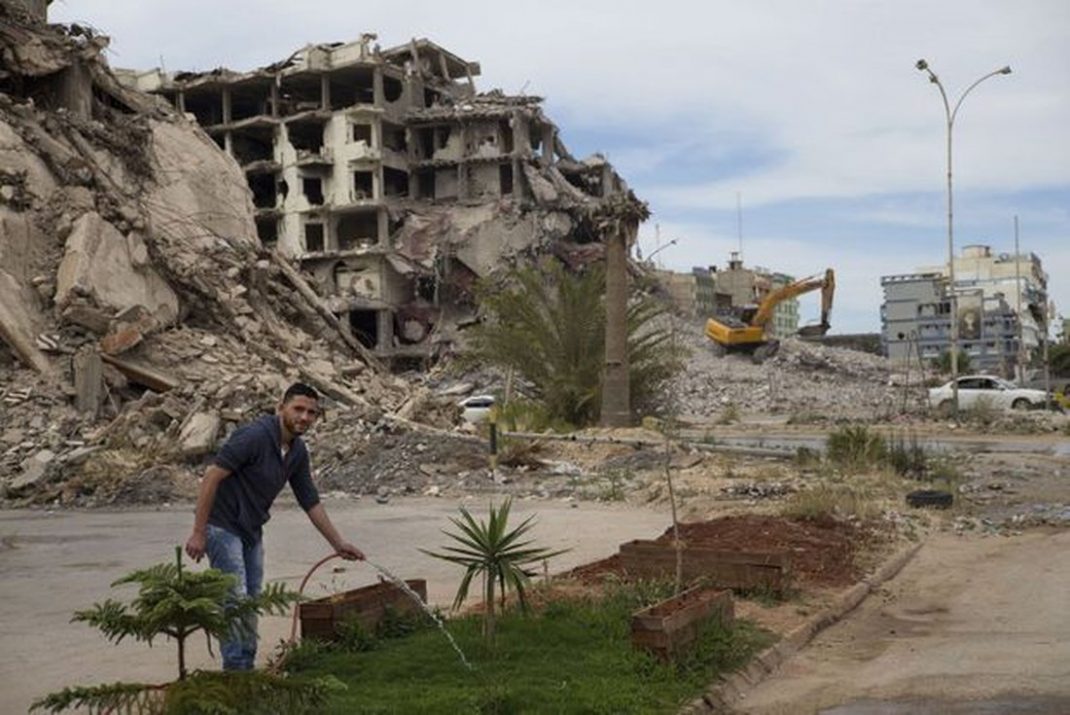By François de Labarre
 Behind his golden counter, the bartender cleans an old Italian espresso machine while listening to American music.
Behind his golden counter, the bartender cleans an old Italian espresso machine while listening to American music.
In the air-conditioned room, a dozen young people settled in club chairs, their eyes riveted on their telephones, apostrophied by screaming.
1,000 kilometers east of the front, the war is played on a network and on smartphones. A group arrives, T-shirts, tight pants, hair flush on the sides, a wick carved on the skull.
In the suburbs of the city, the youth of Benghazi looks for a style, far from the jihadist model imposed during the dark years.
At our table, Ali sips a “lime naâna”, his sweet drink made from lemon and mint. At the approach of thirty, the imposing build, he keeps a naive look.
A little earlier, he told us how to find, under the coat, a bottle of Smirnoff vodka for the equivalent of 50 euros, a fortune in Benghazi.
Those who do not have the means can afford the local liquor for 13 Libyan dinars (8 euros). “It looks like grappa, but much worse. In fact, it’s disgusting, but it makes its effect!
His cunning look sweeps the room, then lights a Marlboro. Here we are, after an hour’s drive, to Venicia, one of the trendiest neighborhoods in Benghazi.
Outside, the succession of subdivisions more or less modern, planted on two perpendicular roads in the middle of vague grounds, Inside, the atmosphere is more cozy, even if it remains exclusively male.
Ali says he is happy to be able to “interact with people from different cultures”. Opportunities are rare in Benghazi. For a long time Westerners and Christians were not tolerated in the city.
Examples of abuses abound: (a) the September 11, 2012 attack that cost the American ambassador Christopher Stevens and three of his bodyguards; (b) the decapitation and its macabre staging on the beaches of the city of seven Egyptian Coptic Christians; (c) the assassination of an American professor who taught at the international school; and (d) that of the French Patrice Réal, who was working on the extension of the Benghazi Medical Center, etc.
“Our expatriates left at the end of 2013 and did not return until the summer of 2018, with a limited presence”, says Emily Beadle, Libya leader of the NGO Acted, very present in Benghazi.
The following year, all consular staff are evacuated from the country. The shouts of joy of the revolution are stifled by the noise of the shells.
The cameras are fleeing the projectiles, the Westerners turn their backs, a bit ashamed to have offered on a plateau a new land of conquest to the international jihadist.
The war that breaks out goes beyond the Libyan framework. Militias settle down with their contingent of foreign fighters.
Tunisians engage in suicide operations against Benghazi security forces as “revolutionary” weapons pour into barges from Turkey, where the Libyan Muslim Brotherhood has set up its rear base.
Then, the inhabitants of Benghazi discover that Libya without Gaddafi, it is also that: hooded militia camped on checkpoints, imposing sharia, conducting campaigns of assassinations of policemen, civilians, military.
Shops, universities, closed schools, deserted roads. “Here, on the crossroads, they played football with heads,” says Ahmed Warfalli, a policeman who, the gun hanging on the belt of his jeans, proudly shows us his “internal security” card before embarking us at the station.
Security forces, after the war, the deep state has regained its rights. The security apparatus reconstituted itself as an organic body after defeating a virus.
“A civil war, yes, we can call it a civil war,” Ali continues with an Olympian calm. And it’s not over.
Today, the front has moved 1,000 kilometers to the west, in Tripoli. Ali wants to win this war, he also thinks of his girlfriend, the money he has to earn to pay for his marriage.
“It’s stupid, here we live between two countries where women can walk in the street without wearing a veil [Egypt and Tunisia]. If my girlfriend does it, she gets insulted. Outside, big 4 × 4 sits on the sidewalk.
The neighborhood is buzzing at the end of the day. It will take another hour in traffic to reach the city center. At three cents a liter, everyone can afford their share of exhaust.
Cars run without a license plate, and it is common to see a 10-year-old child nonchalantly turning a steering wheel wider than his shoulders.
We arrive in the city center at the end of the day, when the sun’s rays pass through the perforated walls. The ancient ruins of the city of Berenice are lost in the middle of other, more recent ruins.
Buildings from the Italian colonial era, ancient Ottoman palaces, modern buildings hastily launched by Gaddafi at the end of his reign gave way under the weight of hatred.
Centuries of cultivation under mounds of rubble. Out of the unhealthy walls grew espresso stalls and booths, where 1 dinar coins roll on counters between ristretto cups.
Around small shops scattered in the streets littered with garbage and plastic bags, people meet to talk, talk about the war while watching a football match, or the opposite.
Some cleared rubble, rebuild their homes. In the middle of a street, an old man sits on his cane.
Others call it “Sidi”. “I am 88 years old and I was an officer in King Idris’s army in 1954, and then I had to leave the army in 1969,” he says, before explaining how Benghazi was a “beautiful city”.
“Today, it is destroyed. “
The closer you get to the heart of the city, the more people are scarce. Most did not even own any title deeds. In the 1970s, Gaddafi enacted a law allowing anyone living in an apartment to become the owner.
In fact, the rents have disappeared and the deeds of sale too. Ruined buildings are orphans. “Neither the municipality nor the state can afford today to finance the reconstruction of the historic center,” says Anas Tashani, Deputy Coordinator of the NGO Acted for the Benghazi region.
There remains a solution: destroy everything, rebuild everything, but with what means?
Anas Tashani remained alone on board during the war to carry out the missions of the NGO.
Funded by the Office of the United Nations High Commissioner for Refugees (UNHCR) and Swiss funds, Acted then ensured the distribution of food and money for the needy, provided training, renovated schools.
“When we set up a kindergarten that welcomed 250 children, the parents wanted to contribute to keep us going because there were too many children on the streets.
System D replaces a state too busy waging war to take over the rest. Evidenced by the lack of garbage collection.
In the middle of the chaotic scenery, islets of greenery and sweetness of life reappear by small touches, like this fish restaurant on the ledge named Bala, like his boss, Mohamed Bala.
He too is happy to see Westerners arrive, it is the proof that security has returned, that the activity resumes. He grabs his phone and writes a few words in Arabic.
Translation: “We are very honored by your visit. It refers to the Regency Hotel, a monumental building that stands a few dozen meters away.
In 2010, Kadhafi wanted to turn this former giant slaughterhouse into a luxury hotel. The old Guide, who saw himself as long as the Queen of England, finally consented to develop this city too long punished for having stood up to him. Too late.
The construction site of the Regency Hotel will be interrupted by the revolution, then the building will be looted during the following years. “Daesh took the ceramics,” says a trader.
A crane erected in the middle of the rubble resisted the assaults.”Over there,” said Mohamed Bala, pointing at the hotel, “I remember when Nicolas Sarkozy and David Cameron came to celebrate the revolution.
They destroyed everything.
In 2011, however, it was to protect this population of Benghazi that the UN Security Council voted the NATO intervention.
Eight years later, it was not Gaddafi’s tanks that ravaged him, but the fighting that followed.
***
François de Labarre – Special envoy to Benghazi. Journalist @ ParisMatch International Policy, Africa, Russia, Middle East.
_________





